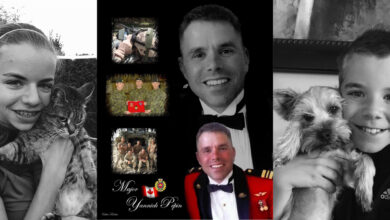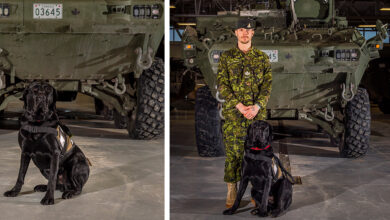Best of CMF Magazine
Pushing Their Limits
Extreme military sporting events like the Ironman, Mountain Man and Bushman demonstrates the level of dedication, perseverance, discipline and endurance of CF personnel.
With each race tailor made to the base they encompass, the races are designed to challenge the motivation and determination of Canadian soldiers, while promoting interaction with, and support of, the public.
“For the last 29 years 2 Brigade has been running the Ironman competition and it is far from the traditional triathlon, one would think of,” explained Colonel Simon Hetherington, commander of 2 Canadian Mechanized Brigade Group.
CFB Petawawa’s Ironman competition is the longest standing of the three races and is an example of the high fitness standards demonstrated by CF members. This year’s event is the largest to date, with 600 participants, necessitating the event to be run over two consecutive days.
Many of us (particularly those of us married to an Air Force member) would probably ask, “why on earth would anyone voluntarily put themselves through this ordeal?” The most popular response from participants and organizers is the sense of accomplishment that comes with the completion of the course, as well as the camaraderie and support it promotes between competitors.
Taking place at three Canadian Forces Bases across the country, CFB Edmonton, CFB Petawawa, and CFB Gagetown, the competitions exemplify the level of commitment military personnel exhibit. Leading up to the event it is not uncommon, at least in Petawawa, to see soldiers marching around town with their rucksacks carrying a canoe down the road.
Leading up to the event, contestants will train for months, to ensure they are prepared to carry a 42 lb rucksack throughout the race while completing a 32 km forced march, a 4km canoe portage, 8km in a canoe paddling down the Ottawa River, and finishing with a 6 km “sprint” to the finish.
“It took me five months,” explained military spouse Necole Miller. “Every event in this competition was new to me. Unlike the soldiers that participate, I do not normally wear combat boots, a ruck or do ruck marches, I wanted to give my body lots of time to work up to the required distances, ensuring that I didn’t get injured.”
Last year Miller was one of the few civilians allowed to complete the Ironman. Although an experienced athlete and personal trainer, the event was something else for the PSP Fitness Instructors.
Miller asked to compete in the race to gain knowledge on how she could prepare military personnel for the event. The time required was significant she noted. “The greatest challenge I had…was that I had to do my training on my own time, which meant Sundays were dedicated to specific training. Every Sunday I got up at 5:30 a.m. to start and as the date got closer to the actual competition, there were times that I didn’t get back home again until midnnight. There were many times when I just wanted to stay in bed, but I got up put on the boots and ruck and away I went.”
This year the Ironman was held over two days, Sept. 6th was for non-competitive participants and Sept. 7th was the competitive day. Along with testing their level of fitness, this year racers also raised money to support the Tim Horton’s Children’s Foundation. Chosen as 2 CMBG charity of choice, Col. Hetherington, commander of the Brigade, explained he wanted to give back to Canadians.
“We would like to use the Ironman this year to give back to Canadians, to give back to those who have supported us so well over the last number of years during our combat years in Afghanistan,” explained Col. Simon Hetherington, adding “it would be very difficult to find a Canadian soldier who served in Afghanistan who didn’t receive a Tim Hortons gift card from a kind Canadian who wanted to say thank you or just wanted to say we are thinking of you.”
Over the past eighteen years, the foundation has been helping to send kids from all across Canada to the Tim Horton’s Summer Camps.
Taking the lead from CFB Petawawa’s Ironman 1 Canadian Mechanized Battle Group (1 CMBG) annual Exercise Mountain Man (also known as the Mountain Man Challenge) was introduced over 15 years ago in Calgary. This year the extreme competition was held Labour Day weekend in Edmonton. More than 300 soldiers from Edmonton, Wainwright and Shilo gathered on Sept. 1, 2012 to participate in the event.
Throughout the race participants carried a 33 lb rucksack, completed a 31.6 km forced march, portaged a canoe 3.2 km, followed by a 10 km paddle along the North Saskatchewan River. The final leg of the race consisted of a 5.6 km sprint to the finish. The Mountain Man Challenge started at 5:00 am and took anywhere from five to eight hours for participants to complete.
“It is a race designed to reduce one to a quivering mess of sweat, blood and tears,” states Pte. Alfred Barr, who completed the Mountain Man Challenge in 2011 as a member of 1st Regiment Royal Canadian Horse Artillery (1 RCHA) team. Barr’s training for the event consisted of rucksack runs with increased distance and a variety of fitness classes with the PSP, including cross-fit, plyometric, and spin classes. “Our one ‘easy day’ was pool training, which I found anything but easy, nearly drowning on several occasions as we tread water with medicine balls above our heads and pushed bricks the length of the pool floor.”
This event is not for the weak-hearted; that much is clear. Medical staff and Military Police personnel are positioned at different stations throughout the course for anyone who requires medical attention. This competition has been described as “brutal” and injuries are common. “We’ve had people whose backs have seized up during the race,” says Christine Salt, Public Affairs Office for 1 CMBG, Edmonton. During the canoe portage, Barr’s left arm and shoulder actually went numb. “Never in my life have I felt more joy and elation as the blessed moment the canoe was taken off my shoulders.” But the support and cheers of his family and the spectators helped him continue. “Good cheer is absolutely indispensable during times of duress. It really does help.”
The most recent edition into the fold is the Bushman, which takes place at CFB Gagetown in July. Where the Bushman differentiates from the Ironman and Mountain Man is the race is team oriented.
Lieut. Dekota Fletcher, 2 Royal Canadian Regiment (RCR) Troop Commander, competed in the event this summer with his 2IC. Marking its fourth year, participants are required to carry a 35 lb rucksack throughout the race. The first leg of the race requires the teams of two to partake in a 15 km forced march followed by a 3.5 km canoe portage. Next the participants paddle the canoe 12.5 km and complete the race with a 12.5 sprint to the finish line.
“We do it with our partners and you have to stay with them,” explained Lieut. Fletcher calling the race, “a shared adventure.”
The command team entered the race to encourage their platoon members to get out and participate in the gruelling race that takes anywhere between four to eight hours.
“It’s a fantastic way to build morale and cohesion for the troops from all ranks,” explains Jim Primeau, who completed the Ironman course last year and is taking part again this year.
“Events like this are very beneficial to the Canadian Forces,” noted Barr. “Not only does it boost morale and increase team spirit, but it helps develop tough, hardened warriors, capable of reaching an objective, finishing a mission, overcoming physical and mental barriers and getting the job done with the professionalism our soldiers are known for.”
By Leslie Dunnett









